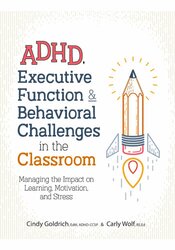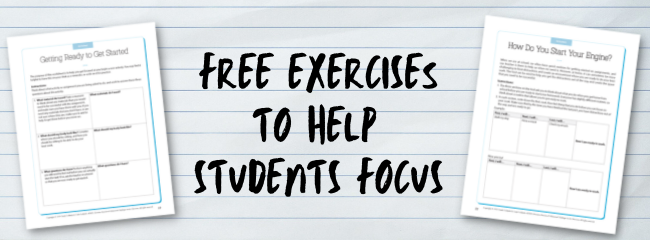Initiation & Activation: 2 Exercises to Help Kids Focus
Strategies to Promote Success in Students with ADHD & Executive Function Challenges

One of the most common struggles for students with ADHD or executive function challenges is staying focused on a specific accomplishment during a given time period. These students may have an especially hard time getting started or simply staying on task while other thoughts or external factors pull their attention away. In turn, once they have settled into their task, it may be very difficult to transition to a completely new activity. Preparing these students ahead of time is the best way to get them physically and emotionally ready to focus on any new task at hand.
Initiation and activation are the skills needed to get started on a task. Whether it’s getting started with a routine task, such as unpacking a backpack, or a more difficult task, such as beginning a book report, some students struggle and may give the appearance of being lazy, unmotivated, or resistant. It may appear as if they are trying to procrastinate starting the activity. However, when we dig a little deeper, we may find that these students have difficulty getting started because they simply don’t know how or where to begin.
To do their best work, these students must figure out what the activity will entail, what should be expected of them, and how much time they will have to complete it. Remember that students with ADHD also have a much harder time activating their brain when they are not intrinsically interested or motivated by the task at hand. Prepare them both emotionally and physically—the upfront investment will drastically lessen the teacher’s time for redirection or any additional fallout.
In addition, transitions can be particularly challenging for students with ADHD and executive functioning challenges. When we ask students to transition from one activity to another, we are actually asking them to do three separate (and often individually challenging) steps: (1) stop the activity, (2) move to the next activity, and (3) start the new activity. Transitions can be supported more fully when we break the movement into three parts and address each step separately.
A transition of space, such as going from school to home, can also bring extra challenges. There are often more external factors that can distract or pull attention away from the task at hand. It can be beneficial to build a routine in all aspects of a student’s life, including homework time. Some students just do better when they know what to expect—regardless of whether or not they are diagnosed with ADHD. Preparation, guidance, and connection are the keys to easing transitions. Guide students in developing successful routines with free exercises from my book: ADHD, Executive Function & Behavioral Challenges in the Classroom.
Initiation and activation are the skills needed to get started on a task. Whether it’s getting started with a routine task, such as unpacking a backpack, or a more difficult task, such as beginning a book report, some students struggle and may give the appearance of being lazy, unmotivated, or resistant. It may appear as if they are trying to procrastinate starting the activity. However, when we dig a little deeper, we may find that these students have difficulty getting started because they simply don’t know how or where to begin.
To do their best work, these students must figure out what the activity will entail, what should be expected of them, and how much time they will have to complete it. Remember that students with ADHD also have a much harder time activating their brain when they are not intrinsically interested or motivated by the task at hand. Prepare them both emotionally and physically—the upfront investment will drastically lessen the teacher’s time for redirection or any additional fallout.
In addition, transitions can be particularly challenging for students with ADHD and executive functioning challenges. When we ask students to transition from one activity to another, we are actually asking them to do three separate (and often individually challenging) steps: (1) stop the activity, (2) move to the next activity, and (3) start the new activity. Transitions can be supported more fully when we break the movement into three parts and address each step separately.
A transition of space, such as going from school to home, can also bring extra challenges. There are often more external factors that can distract or pull attention away from the task at hand. It can be beneficial to build a routine in all aspects of a student’s life, including homework time. Some students just do better when they know what to expect—regardless of whether or not they are diagnosed with ADHD. Preparation, guidance, and connection are the keys to easing transitions. Guide students in developing successful routines with free exercises from my book: ADHD, Executive Function & Behavioral Challenges in the Classroom.
Discover Evidence-Based Practices to Help Students with ADHD, Executive Function & Behavioral Challenges

Take advantage of the latest brain research and evidence-based best practices to get kids motivated, focused, organized, and performing closer to their real potential.
ADHD and executive function expert Cindy Goldrich and Special Education teacher Carly Goldrich combined efforts to create this powerful resource to help teachers and professionals understand and connect with students. These practical tools and worksheets are designed to help students become resourceful, accountable, optimistic, and perseverant.
Included for easy reproduction are resources and worksheets to address issues related to:
ADHD and executive function expert Cindy Goldrich and Special Education teacher Carly Goldrich combined efforts to create this powerful resource to help teachers and professionals understand and connect with students. These practical tools and worksheets are designed to help students become resourceful, accountable, optimistic, and perseverant.
Included for easy reproduction are resources and worksheets to address issues related to:
- Practical, non-distracting movement
- Improving task initiation, planning, and time-management
- Strengthening emotional regulation, cognitive flexibility, and frustration tolerance
- Teaching effective communication and collaboration skills
- Managing stress and anxiety in school and at home
- Creating a growth mindset temperament and improving perseverance
- Using goal-setting techniques to improve performance and confidence
Meet the Expert:
Cindy Goldrich, Ed.M., ADHD-CCSP, is a mental health professional, certified ADHD coach, and teacher trainer. She is the author of 8 Keys for Parenting Children with ADHD, a book recognized for providing parents, educators, and therapists with a practical, easy-to-read guide for addressing challenging kids. She is the creator of the workshop series Calm and Connected: Parenting Children with ADHD©, designed to teach parents and caregivers how to manage and support their children’s unique needs successfully. Through her ADHD Parent Coach Academy, she trains other professionals to become ADHD parent coaches.
Cindy is known to be a passionate, engaging speaker. She conducts training workshops for schools, associations and national conferences addressing how ADHD and executive function deficits impact children and how to help boost behavior and performance in school and at home.
Cindy received her Master’s in Education in Counseling Psychology from Columbia University, Teachers College and her ADHD coach certification from the Institute for the Advancement of ADHD Coaching. She is a certified mentor for Think: Kids, formally The Collaborative Problem Solving (CPS) Institute, dedicated to understanding and helping challenging children and adolescents. She is the co-founder and president of the Long Island Professionals ADHD Consortium and is on the executive board of NASSAU CHADD.
Learn more about their educational products, including upcoming live seminars, by clicking here.
Cindy is known to be a passionate, engaging speaker. She conducts training workshops for schools, associations and national conferences addressing how ADHD and executive function deficits impact children and how to help boost behavior and performance in school and at home.
Cindy received her Master’s in Education in Counseling Psychology from Columbia University, Teachers College and her ADHD coach certification from the Institute for the Advancement of ADHD Coaching. She is a certified mentor for Think: Kids, formally The Collaborative Problem Solving (CPS) Institute, dedicated to understanding and helping challenging children and adolescents. She is the co-founder and president of the Long Island Professionals ADHD Consortium and is on the executive board of NASSAU CHADD.
Learn more about their educational products, including upcoming live seminars, by clicking here.




